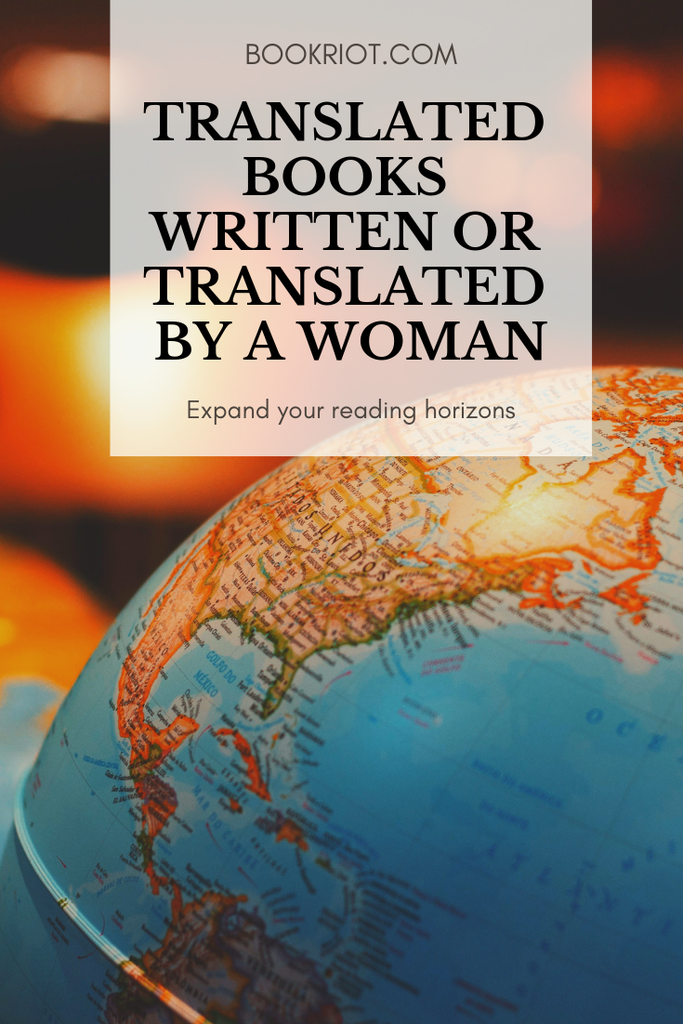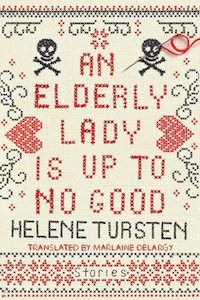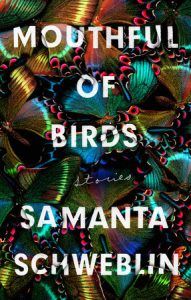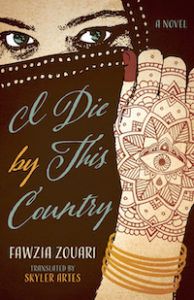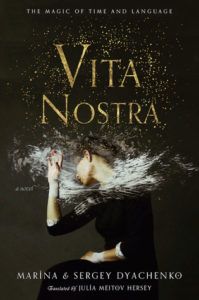Created by Book Riot, this smartly designed reading log consists of entry pages to record stats, impressions, and reviews of each book you read. Evenly interspersed among these entry pages are 12 challenges inspired by Book Riot’s annual Read Harder initiative, which began in 2015 to encourage readers to pick up passed-over books, try out new genres, and choose titles from a wider range of voices and perspectives. Indulge your inner book nerd and read a book about books, get a new perspective on current events by reading a book written by an immigrant, find a hidden gem by reading a book published by an independent press, and so much more. Each challenge includes an inspiring quotation, an explanation of why the challenge will prove to be rewarding, and five book recommendations that fulfill the challenge. This Read Harder task takes us on a journey across cultures and languages. Of the dozens of books I read last year, I’m pretty sure a whole five of them were originally written in a language other than English—and I don’t think I’m alone. Unless something huge bubbles to the top, like Elena Ferrante’s Neapolitan novels did a few years ago, it’s hard to know where to start. Of the thousands of books published in the United States in English each year, a fraction are works in translation. Lately, though, it feels like more translated books are beginning to get the spotlight. The National Book Awards began giving an award for best translation in last year. The first book to win the award was The Emissary by Yoko Tawada, translated by Margaret Mitsutani, and you may also want to take a look at their list of nominees, some of which I’ve included in this list. You can really start anywhere with this task. You might could start with a genre you know you like. Or you could start with a place you’ve always wanted to visit. I tried to round up books from a variety of different geographic locations. Of course, this is by no means an exhaustive list. If nothing here speaks to you, try our list of 50 Must-Read Books by Women in Translation.
The Lover by Marguerite Duras, Translated from French by Barbara Bray
The Lover is the autobiographical story of a nameless white teenage girl who becomes the lover of a wealthy twenty-seven-year-old Chinese businessman in French colonial Vietnam. The girl’s family is poor and her mother suffers from mental illness—the girl is aware that she will soon have to make her way in the world alone.
Candy by Mian Mian, Translated from Chinese by Andrea Ligenfelter
The jacket copy describes this book as “a blast of sex, drugs, and rock ‘n’ roll.” The protagonist is a 22-year-old woman who gets wrapped up in China’s nightlife and drug scene in the early 2000s and questions everything she had been brought up to believe.
An Elderly Lady is Up to No Good by Helene Tursten, Translated from Swedish by Marlaine Delargy
Maud is 88 years old and lives rent-free in an apartment that has been in her family since her father’s untimely death when she was eighteen. She lives a solitary existence but gets up to all kinds of mischief including foiling the plans of a local celebrity who would like to steal the apartment and spoiling the engagement of a long-ago lover. When there is a murder in her apartment complex, she finds herself under investigation by Detective Inspector Irene Huss. If you enjoy this book, Detective Inspector Huss appears in several of Tursten’s other books.
Disoriental by Négar Djavadi, Translated from French by Tina Kover
While waiting for her appointment at a fertility clinic, Kimiâ Sadr unravels the history of her family, her parents’ involvement Iranian politics, and a dose of rock-and-roll—as well as the events that had led her family to flee Iran for Paris, and to her presence in that clinic.
Mouthful of Birds by Samanta Schweblin, Translated from Spanish by Megan McDowell
This is a new collection of short stories by an author known for her unsettling, eerie prose. The author has also released a novella in English called Fever Dream. Recommended for those who enjoy feeling slightly off-kilter. Also: I am pretty sure this book has one of the most beautiful covers I have ever seen.
Moonstone: The Boy Who Never Was by Sjón, Translated from Icelandic by Victoria Cribb
This miniature historical epic is the story of a young man on the fringes of society at a tumultuous moment in history. Máni Steinn is queer in 1918, in a world at war and a homogenous country defenseless against the Spanish flu. However, the war has also brought cinema to Reykjavik and Steinn is captivated. In an uncertain world, will he retreat into the movies or engage in a society that has rejected him?
Hex by Thomas Olde Heuvelt, Translated from Dutch by Nancy Forest-Flier
The people of the town of Black Spring in upstate New York are bound by the secret of the Black Rock Witch. The residents have made an uneasy truce with the witch and with each other—once you move to Black Spring, you never leave, and so the secret remains. When some of the town’s teenagers leak footage of the witch onto the internet, disaster strikes. This book is interesting as both a translation and adaptation because the original Dutch version takes place in a small town the Netherlands. The author chose to relocate the town and change the ending in the English version.
Comemadre by Roque Larraquy, Translated from Spanish by Heather Cleary
This short novel includes a doctor implicated in a misguided experiment and, one hundred years later, a celebrity in search of physical perfection. It is a story about the horrors that occur in the search for physical and collective progress and how far we are willing to go.
I Die by This Country by Fawzia Zouari, Translated from French by Skylar Artes
Inspired by a French news story, the story begins with the arrival of an emergency crew at a Parisian apartment. Two emaciated sisters are brought out of the apartment on stretchers and one of the sisters, Nacéra, remembers the war for independence in then-French Algeria that led to her family’s immigration to Paris and the struggles she and her sister faced in trying to find their place in a world that rejects immigrants and their children.
River of Fire by Qurratulain Hyder, Translated from Urdu by the author
Spanning four Indian epochs (the classical, the medieval, the colonial, and the modern), Ring of Fire traces four souls, characters who bear the same names in each era and who, in their actions, choices and conflicts, trace the history of India. Qurratulain Hyder was awarded the Bharatiya Gnanpith, India’s highest literary award, in 1989.
The Beekeeper: Rescuing the Stolen Women of Iraq by Dunya Mikhail, Translated from Arabic by Max Weiss and Dunya Mikhail
As Dunya Mikhail conducted extensive interviews with women who had escaped from Daesh after suffering torture, abuse, and separation from their families, a story began to emerge of an unlikely hero: a beekeeper and a network of transporters and helpers who worked together to bring the women to safety. This work of nonfiction is the story of how ordinary people chose to risk their own lives to save others.
Wait, Blink: A Perfect Picture of Inner Life by Gunnhild Øyehaug, Translated from Norwegian by Kari Dickson
A literature student falls in love with an older author, a reluctant new mother struggles to create as a performance artist, and an aspiring movie director scouts locations for films she will never make. Their stories intersect in this novel about the pressures we face in our lives and how one lives in a world that is both frightening and ridiculous in turn.
The Fury and Cries of Women by Angèle Rawiri, Translated from French by Sara Hanaburgh
Called “Gabon’s first female novelist,” Angèle Rawiri writes an account of a modern woman, Emilienne, who questions traditional values and seeks emancipation from them. Emilienne studies in Paris, marries a man from another ethnic group, becomes a professional success, takes a female lover—and is still dissatisfied. This is a story of African feminism in the 1980s and the issues women face around the world.
Convenience Store Woman by Sayaka Murata, Translated from Japanese by Ginny Tapley Takemori
When Keiko takes a job in a convenience store in college, her parents are delighted for her because they’ve always worried about how she would get along in the real world. She continues to work in that convenience store for eighteen years. She is comfortable with her life but is aware that she is not living up to society’s expectations. Then she meets a similarly alienated young man who upsets her comfortable stasis.
Flights by Olga Tokarczuk, Translated from Polish by Jennifer Croft
A story told in 116 short pieces, Flights explores what it means to be a person traveling through time as well as space through stories of dissection, poisoning, madness, and determination.
A Winter’s Promise by Christelle Dabos, Translated from French by Hildegarde Serle
This young adult novel follows an event called “The Rupture,” in which the world was shattered into many floating islands, or Arks, each of which has a unique relationship to time. The Arks are watched over by an omnipotent ancestor. Ophelia lives on Anima, an ark where objects have souls. She possesses the ability to communicate with the souls of objects and can also travel through mirrors. Her life is disrupted when she is promised in marriage to a member of the powerful Dragon clan and must leave her family to go with her fiancé to the Ark of the Pole. She does not know why she has been chosen, nor why she must hide her identity. She has become a pawn in a deadly plot. This is the first book in a series.
After the Winter by Guadalupe Nettel, Translated from Spanish by Rosalind Harvey
Cecilia, a young Mexican woman, has few friends, and a morbid fascination with watching the funerals taking place in Père-Lachaise cemetery. She has come to Paris to study literature. She becomes friends with her neighbor, a sickly young men who is also interested in death and who, in fact, believes that he can communicate with the dead. When he decides to leave for Sicily, Cecilia is left alone once more. A chance meeting with Claudio, a man from New York with an obsessive, misogynistic nature has transformative consequences for both of their lives.
Vita Nostra by Marina and Sergey Dyachenko, Translated from Russian by Julia Meitov Hersey
In this dark fantasy novel, Sasha Samokhina meets Faris Kozhennikov while vacationing on the beach with her mother. He directs her to complete a series of tasks and pays her in strange golden coins. As the summer ends, her mentor directs her to use the coins to enter the Institute of Special Technologies where she finds the lessons obscure, the books impossible to read, and the consequences for the families of the students terrible—she also discovers that the changes she undergoes there are like nothing she has ever dreamed of, and are all that she could ever want.
La Bastarda by Trifonia Melibea Obono, Translated from Spanish by Lawrence Shimel
La Bastarda is the first novel by an Equatorial Guinean woman to be translated into English. Okomo is an orphan who lives with her grandmother and dreams of finding the father she is forbidden from seeking on her own. In order to find him, she enlists the help of her fellow outcasts: her gay uncle and a gang of “indecent” girls, one of whom she falls in love with.

